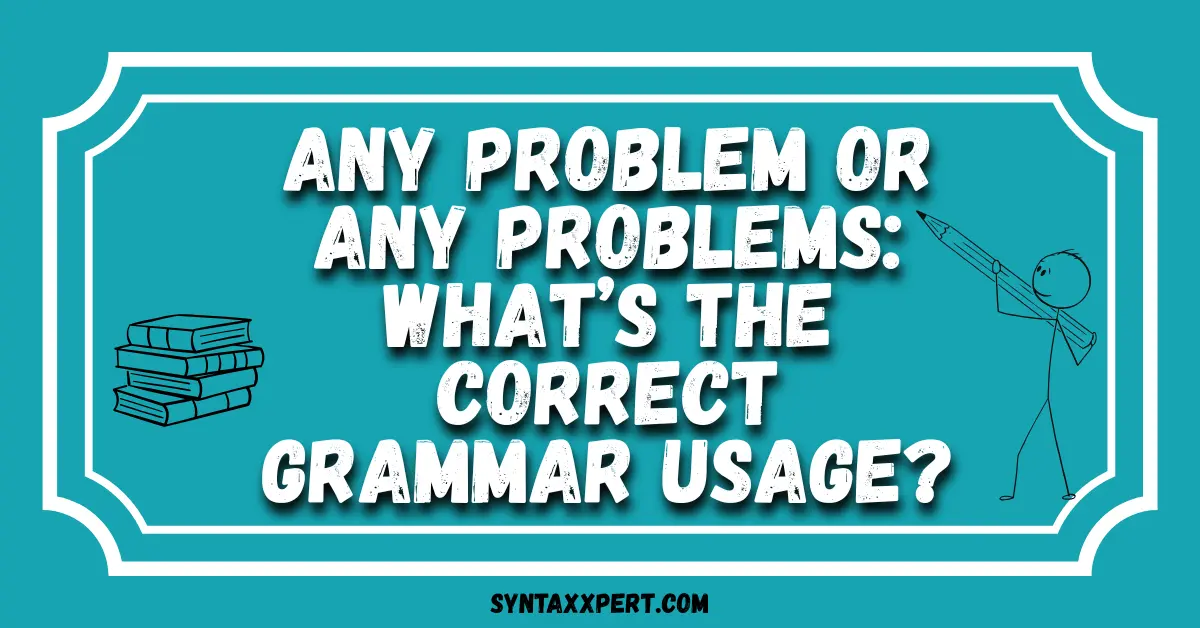Have you ever wondered which phrase is correct — Any Problem or Any Problems? Both sound right in different situations, but they don’t mean the same thing. Understanding the difference can make your English sound more natural and grammatically accurate in both writing and conversation.
In this guide, we’ll break down everything you need to know — from grammatical rules and examples to how native speakers actually use each phrase.
The Grammar Rule Behind Any Problem and Any Problems
Let’s start with the basics. The word “any” can be used with both singular and plural nouns depending on the context and meaning.
| Phrase | Grammatical Structure | When to Use | Example |
| Any Problem | “Any” + Singular Countable Noun | Used when referring to a single issue or asking generally if there is one. | “Is there any problem with the delivery?” |
| Any Problems | “Any” + Plural Countable Noun | Used when referring to multiple issues or asking generally if there are several. | “Have you had any problems with your laptop?” |
✅ Key rule: Use any problem when referring to a singular situation or when speaking generally. Use any problems when referring to possible multiple issues or experiences.
The Meaning Difference Explained
Though both are grammatically correct, their meanings change slightly depending on context.
When to Use Any Problem
You use any problem when you’re asking or talking about whether a problem exists at all.
Examples:
- “Is there any problem with your order?”
- “If you face any problem, call customer service.”
- “There isn’t any problem at all.”
👉 It’s used when referring to the existence of a single issue — or no issue at all.
When to Use Any Problems
You use any problems when talking about multiple or specific issues someone might have encountered.
Examples:
- “Did you experience any problems installing the software?”
- “Let me know if you have any problems accessing the file.”
- “He didn’t mention any problems during the process.”
👉 It’s more common in spoken English when talking about varied situations or repeated experiences.
Native Speaker Insights (Real-World Usage)
To understand this better, let’s look at how native speakers actually use both phrases.
Case Study: Customer Support Conversations
In customer support:
- Agents often say: “Is there any problem with your order?” when checking for a single issue.
- But after an issue is reported, they’ll ask: “Have you had any problems before?” to gather history.
This shows that the choice depends on context and timing — not just grammar.
Fact:
According to usage data from online English corpora (COCA and BNC), any problems appears more often in spoken English, while any problem is slightly more formal and frequent in written communication such as reports and emails.
Common Mistakes to Avoid
Many learners mix the two because they both sound right. Here are some common errors:
| ❌ Wrong Usage | ✅ Correct Usage | Explanation |
| “If you have any problem, contact me.” | “If you have any problems, contact me.” | Talking about possible multiple issues. |
| “He didn’t face any problems.” | ✅ Correct | This is perfectly fine — plural used for general experiences. |
| “There isn’t any problems.” | “There aren’t any problems.” | The verb should agree with plural “problems.” |
Tip: Always match your verb with the noun — singular with “is”, plural with “are.”
Context-Based Examples
Here’s how the meaning changes depending on context:
| Context | Correct Phrase | Example Sentence |
| Asking about one issue | Any problem | “Is there any problem with your car?” |
| Discussing multiple issues | Any problems | “Have you noticed any problems since the update?” |
| Offering help | Any problems | “Let me know if you have any problems using this.” |
| Checking situation generally | Any problem | “There’s no problem at all.” |
Synonyms and Alternative Phrases
If you want to sound more natural or professional, you can use synonyms depending on context.
| Situation | Alternative Phrase | Example |
| Formal | “Any issues” | “Do you have any issues with your order?” |
| Polite | “Any concerns” | “Please share if you have any concerns.” |
| Informal | “Anything wrong” | “Is there anything wrong with your account?” |
| Supportive | “Any difficulties” | “Are you facing any difficulties logging in?” |
These variations are useful in business communication, emails, and customer service contexts.
Expert Quote
“Both any problem and any problems are grammatically correct — the choice depends on whether you’re referring to one possible issue or several. Context always dictates correctness.” — Linguist Dr. Helen Carter, Oxford English Department
Read More >>> Nighttime or Night Time: Which Spelling Is Correct?
Which One Should You Use?
Here’s a quick summary to remember:
- Use Any Problem → when you’re talking about the existence of one issue or none at all.
- Use Any Problems → when you’re referring to possible multiple or specific issues.
Think of it like this:
If you can imagine more than one issue, use problems. If you’re asking generally or formally, use problem.
Conclusion
Both Any Problem and Any Problems are correct — it just depends on how many issues you’re referring to and the tone of the situation. In formal writing (like reports or business emails), any problem is slightly preferred. In casual or conversational English, any problems sounds more natural and flexible.
So next time someone says, “Is there any problem?”, you’ll know exactly why they used that form — and when you can confidently use “any problems” instead.
✅ Key Takeaways
- Any problem = singular or general issue.
- Any problems = multiple or possible issues.
- Both are grammatically correct — context matters most.
- Synonyms like “any issues,” “any concerns,” or “any difficulties” add variety to your speech and writing.

I’m Luna Hazel, a grammar expert here to help you master the art of clear, confident writing. Let’s make every word count!

